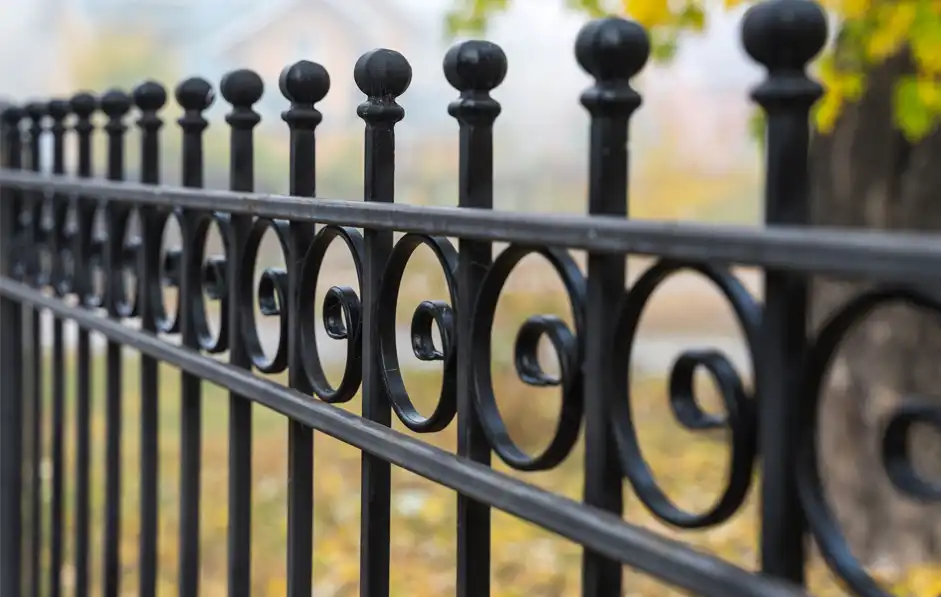All Categories
Featured

Among the most prominent alternatives, timber, plastic, and aluminum each offer one-of-a-kind benefits and drawbacks. Here's a breakdown of the pros and cons of these three usual secure fencing products.
Wood Fence. Wood fence has been a timeless choice for home owners due to its all-natural elegance and convenience.
Pros:. Aesthetic Charm: Wood uses a timeless and cozy appearance that enhances a variety of building designs. Personalized: It can be repainted, stained, or reduce right into special designs to match personal preferences. Cost-efficient: Originally, timber secure fencing can be an affordable alternative compared to various other products. Eco-Friendly: Timber is a renewable source and can be sustainably sourced. Disadvantages:. High Maintenance: Wood requires regular sealing, staining, or painting to stop rot, insect damage, and weathering. Sturdiness Concerns: Without appropriate treatment, wood can warp, split, or degeneration gradually, especially in areas with high moisture. Much shorter Life expectancy: A wood fencing typically lasts 10-20 years, relying on the kind of timber and degree of maintenance. Wood is excellent for those who value a conventional look and are ready to commit to its upkeep.
Plastic Fencing. Vinyl is a contemporary, low-maintenance secure fencing choice that has grown in appeal recently.

Pros:. Low Upkeep: Plastic does not require paint, staining, or sealing and can be conveniently cleaned with soap and water. Climate Resistant: It withstands severe climate condition without rotting, rusting, or bending. Long-Lasting: Plastic fencings can last 20-30 years with minimal maintenance. Variety of Styles: Available in many shades, layouts, and textures, some vinyl alternatives imitate the look of wood. Disadvantages:. Higher Upfront Expense: Vinyl fencing can be much more pricey initially contrasted to wood. Brittleness in Cold Weather condition: In extreme cool, plastic might crack or become breakable. Minimal Services: Private panels can be challenging to change, calling for cautious matching to the existing fencing. Vinyl is ideal suited for property owners looking for a durable, low-maintenance solution with modern-day looks.
Aluminum Secure Fencing. Aluminum secure fencing is a lightweight and resilient alternative, commonly picked for its modern look and flexibility.
Pros:. Rust-Resistant: Aluminum does not rust, making it a superb choice for damp or damp environments. Low Maintenance: Needs minimal upkeep and is very easy to clean. Resilient: While lightweight, aluminum is solid sufficient to hold up against several ecological problems. Lengthy Life expectancy: Can last several decades without considerable wear or wear and tear. Selection of Styles: Uses a stylish and streamlined appearance, typically utilized for attractive or decorative functions. Cons:. Greater Price: The first investment for light weight aluminum secure fencing is more than timber or plastic. Much Less Personal privacy: Light weight aluminum fences are typically created with open pickets, making them much less effective for personal privacy. Susceptible to Damages: Although resilient, aluminum can be nicked by solid effects. Light weight aluminum is ideal for those looking for a fashionable, long-lasting option that requires marginal treatment.
Making the Right Option. Each fence material-- vinyl, wood, and light weight aluminum-- offers unique advantages and negative aspects. Your decision ought to depend on your particular priorities, such as spending plan, upkeep preferences, climate, and visual goals:
Pick wood if you love a traditional look and do not mind routine maintenance. Choose plastic if you desire a low-maintenance, weather-resistant fencing with modern-day appeal. Select aluminum if you prioritize toughness, corrosion resistance, and a smooth design. By weighing these cons and pros, you can choose a fence product that boosts your home while satisfying your practical requirements.
Latest Posts
Explore WyHy FCU – Low Rates for Members
Published May 27, 25
1 min read
Uncover Cost-Effective Auto Repairs with Montclare’s Limited-Time Service Specials
Published May 23, 25
1 min read
Explore Montclare Auto Repair’s Premier Services and Why Drivers Trust Them
Published May 23, 25
1 min read
More
Latest Posts
Explore WyHy FCU – Low Rates for Members
Published May 27, 25
1 min read
Uncover Cost-Effective Auto Repairs with Montclare’s Limited-Time Service Specials
Published May 23, 25
1 min read
Explore Montclare Auto Repair’s Premier Services and Why Drivers Trust Them
Published May 23, 25
1 min read